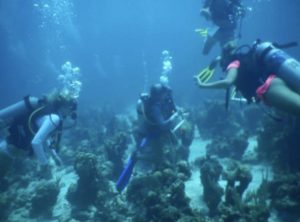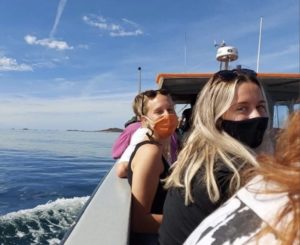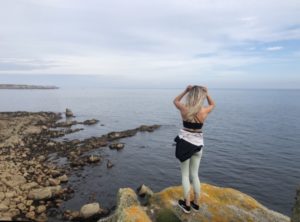We are looking back on some of our MSc graduates who have excelled in marine science around the world since studying with us. Today we meet Janey Sellars, MSc Marine Environmental Management graduate (2021) and now the Project Coordinator for the ExeterMarine research network here at the University of Exeter.

What did you enjoy most about studying at the University of Exeter?
Studying alongside like-minded individuals who also shared a passion for the marine environment and the importance of protecting it.
What were the best aspects of studying your course?
Although I undertook my masters degree during the covid pandemic which meant that my fieldtrip to the Maldives was cancelled, we were still able to go on a local fieldtrip to the Isles of Scilly. The staff invested a lot of time an effort into making sure this was possible for all students
What skills and experiences did you gain that will/have been useful for job/internship applications?
I was able to undertake more networking during my masters compared to my undergraduate degree which motivated me to find freelance work alongside my masters. Although this was separate to my university degree I was given support from my course leaders and lecturers as to who to reach out to for gaining further experience.

Why did you choose to study at the University of Exeter?
I had already lived and studied marine science in Cornwall prior to starting my undergraduate and postgraduate degree so it has been home to me now. Furthermore, the University of Exeter has a good reputation for marine science research and has strong affiliations externally which I figured would come in useful upon completion of my degrees.
Do you think there are any factors that make the University of Exeter a unique place to study?
I think its location on the Cornwall campus what makes it particularly unique. Having done both my undergraduate and postgraduate degree here I’m unsure as to how the university differs in some areas than others but I know their level of research is next to none in comparison to other universities in this field as they reach universities and organisations internationally.

What skills and experience have been most useful for your career? And how do you think your programme prepared you for your career/current role?
I think my masters degree provided me a more specialised and niche understanding of the issues facing our marine environments and the necessary tasks required to protect them for future years to come. I think my masters provided me more information on the potential organisations and jobs available out there for when I completed it.
Why did you choose this career?
I had always been interested in the marine environment and had a particular interest in social science within the marine and fisheries sector, considering it’s becoming an increasing global issue. I have hoped that in the future I will be able to work with communities to provide sustainable methods of using marine environments to their benefit whilst preventing further irreversible damage.
What advice would you give to a current student who wishes to pursue your career?
I would say firstly identify the route or area of the sector you want to pursue, as that narrows it down massively and enables you to focus on gaining experience and finding work in a smaller sector rather than applying for lots of jobs. Then research potential types of work you want to consider, whether it be working with governmental bodies, NGOs, individuals or freelance. Take courses, volunteer, reach out and contact people for advice and you will gradually gain experience and networks which may eventually lead onto a job. I believe persistence is key.

What are your plans for the future?
I haven’t thought too far ahead into the future but am enjoying the experience I’m gaining in my current role which will act as a great stepping-stone job onto a future job. If the right job comes up then I will take it wherever, but I have considered travelling or potentially gaining some practical experience on boats to pair with my industry experience and education.
What advice would you give to anyone thinking of applying to the University of Exeter?
I would say consider the topics which interest you the most and base your decisions on that. At an undergraduate level in the bioscience field there is a lot of overlap so generally choose the degree title that you would like to have a degree in. There is often only a module or two on each year on each degree which specialise in the degree title and modularity allows you to choose modules across other degrees. At a masters level I would advise to choose more carefully as I would imagine you’re choosing a masters degree to gain more experience in a more specialised topic to further you experience for an industry job in that topic.

